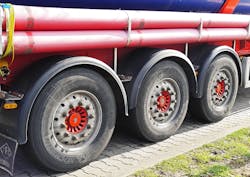During the week before Thanksgiving, a 38-year-old woman tragically lost her life when her vehicle was struck by a loose truck tire on Interstate 5 in San Clemente, Calif. As I tried to find out more about the accident, it seemed like the majority of the information was coming from law firms. One of them extended their deepest condolences to the family of the victim, then called for witnesses to contact the local police department because “there needs to be some accountability for what happened. Tires do not come off of trucks randomly.”
The last sentence should send chills up the spine of every fleet owner or operator. There is no data to support that statement. In some instances, the reason for the wheel-off is obvious; in others, it is not. To the attorney representing the injured party or the grieving family, there are always other parties to blame. That same website listed the “numerous entities (that) could face civil liability if a tire comes off of a truck and causes an accident,” including:
- The company that owned the truck.
- The owner of the cargo being hauled.
- The company responsible for the truck’s maintenance.
- The manufacturer of the tire’s component parts.
- The manufacturer of the truck’s trailer.
I’ve served as an expert witness in several civil lawsuits over the years—and this is exactly what happens after an accident. Every entity even remotely connected to the vehicle can expect to be named. To start with, there will be a subpoena for the maintenance records of the vehicle, the service procedures from the company that installed the wheel, and the training records for the individual who performed the service. The legal microscope is unforgiving and virtually impossible to avoid in accidents like the one that occurred a couple of months ago. There are a lot of reasons why a tire and wheel assembly come off of a vehicle. As I said, in some instances, the signs are obvious; in others, the ultimate cause of the accident is more difficult to determine.
I was involved in an investigation where the technician did everything by the book, and the components appeared to be in good condition at the time of installation. The proper torque was used to tighten the fasteners, and the service provider could even prove the torque wrench was calibrated. The driver was notified of the need for a torque check after 50 to 100 miles, and then returned the vehicle to service like they’ve always returned every vehicle to service without an issue. A few thousand miles later, the wheels came off.
After reviewing the details of the case, it was obvious that the service provider had a system for installing wheels with the correct torque and based on the evidence, I could assume it was followed. The fleet had pre-and post-trip inspection forms going back thousands of miles without any indication of loose fasteners. According to their maintenance records, the wheels were last serviced by the company I was representing—and they had the receipt to prove it. Regardless, both the fleet and the service provider were named defendants because a wheel-off caused an accident. “Tires do not come off randomly.”
To quote a famous line in the 1980’s movie The Breakfast Club, “Screws fall out all the time. The world’s an imperfect place.” There is no conceivable way to completely prevent wheel-off accidents. We can reduce the risks by following the industry-recommended guidelines for the wheel system being installed, but that’s no guarantee.
Variables like previously under-torqued or over-torqued installations, overloading, and impact all play a role in the ability of the components to create sufficient clamping force at the correct torque. Properly trained technicians understand the relationship between torque and clamping force, so they know what steps must be taken to ensure the correct clamping force. Clamping force is the key. Since it cannot be measured in the field, controlling the torque is the best method for approximating the correct amount. “The world’s an imperfect place.”
There are wheel-off accidents that are definitely caused by service providers who don’t follow industry standards and/or fleets that don’t maintain their vehicles. I agree that “there needs to be some accountability for what happened” in those instances. Then there are wheel-off accidents where the evidence indicates that both parties did their jobs, but the physical condition of the components at the time of the accident is questionable. Finally, there are times when an accident is just an accident. The wheel-off cannot be reasonably explained because both parties fulfilled their obligation to minimize the risk by following industry guidelines.
Regardless of which set of facts accompany the wheels coming off the vehicle, the fleet and service provider will still be held accountable. If the technician was trained to inspect and properly install the wheels with the recommended torque so the correct clamping force can be approximated, then the service provider has a good defense. Then the fleet must abide by federal vehicle inspection regulations and use service providers with qualified employees who follow industry standards for wheel installation. It’s as close as we can get to perfection.
About the Author
Kevin Rohlwing
Kevin Rohlwing is the SVP of training for the Tire Industry Association. He has more than 40 years of experience in the tire industry and has created programs to help train more than 180,000 technicians.
